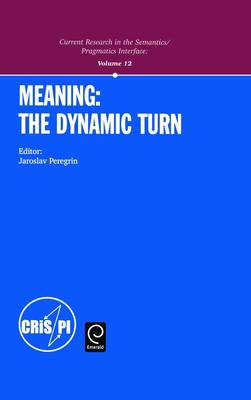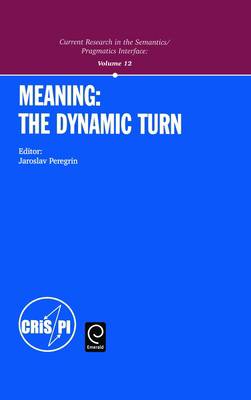
- Afhalen na 1 uur in een winkel met voorraad
- Gratis thuislevering in België vanaf € 30
- Ruim aanbod met 7 miljoen producten
- Afhalen na 1 uur in een winkel met voorraad
- Gratis thuislevering in België vanaf € 30
- Ruim aanbod met 7 miljoen producten
Zoeken
Meaning: The Dynamic Turn
€ 228,95
+ 457 punten
Omschrijving
In recent decades, many theories of formal semantics of natural language have undergone what can be called a dynamic turn: they have moved from treating language as a static system to considering it 'in action' and to taking meanings as crucially involving 'context-change potentials'. The theories, however, usually concentrate much more on the hows of the turn than on its whys; and as a result, the conceptual foundations of dynamic semantics are much less elaborated than its technical side. This book, based on a conference held in Prague in September 2001, is a contribution to filling this gap: it consists of papers addressing, from various sides, the foundational questions of the dynamic theories of meaning. It includes contributions of writers who are commonly held as authorities concerning the turn, who, however, here concentrate more on the why's than on the how's of dynamic semantics. Hence the book should be of interest both for those who want to know what the turn is about, and for those who are not satisfied with knowing the technical side of dynamic semantics and want to know its point.
Specificaties
Betrokkenen
- Uitgeverij:
Inhoud
- Aantal bladzijden:
- 288
- Taal:
- Engels
- Reeks:
- Reeksnummer:
- nr. 12
Eigenschappen
- Productcode (EAN):
- 9780080441870
- Verschijningsdatum:
- 22/10/2003
- Uitvoering:
- Hardcover
- Formaat:
- Genaaid
- Afmetingen:
- 154 mm x 229 mm
- Gewicht:
- 576 g

Alleen bij Standaard Boekhandel
+ 457 punten op je klantenkaart van Standaard Boekhandel
Beoordelingen
We publiceren alleen reviews die voldoen aan de voorwaarden voor reviews. Bekijk onze voorwaarden voor reviews.










